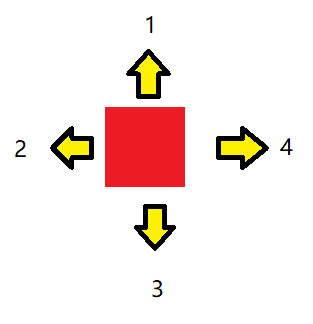DFS模板
void dfs(int depth)//depth表示当前的层数(或深度) { if(depth>n)//到达叶子节点,该路已走到尽头 return; for(int i=1;i<=n;i++)//n表示最大的值,即最大深度为n { if(b[i]==0)//b数组表示探索的状态,1表示已被探索,0表示尚未被探索 { b[i]=1;//标记当前的b[i]已被探索 a[level]=i;//记录当前的节点值 dfs(level+1);//进一步的搜索 b[i]=0;//还原当前的b[i]元素被探索的状态 } } }
数字型搜索
全排列问题
题目描述
排列与组合是常用的数学方法。
先给一个正整数 ( 1 < = n < = 10 )
例如n=3,所有组合,并且按字典序输出:
1 2 3
1 3 2
2 1 3
2 3 1
3 1 2
3 2 1
输入
输入一个整数n( 1<=n<=10)
输出
输出所有全排列
每个全排列一行,相邻两个数用空格隔开(最后一个数后面没有空格)
样例输入 Copy
3
样例输出 Copy
1 2 3
1 3 2
2 1 3
2 3 1
3 1 2
3 2 1
#include<bits/stdc++.h> #include<queue> using namespace std; const int N=100; typedef long long ll; int n,a[10010],b[10010]; void print() { for(int i=1;i<=n;i++) { printf("%5d",a[i]); } cout<<endl; } void dfs(int level) { if(level==n+1) { print(); return; } for(int i=1;i<=n;i++) { if(b[i]==0) { b[i]=1; a[level]=i; dfs(level+1); b[i]=0; } } } int main() { cin>>n; dfs(1); }
【牛客】 Factorial
1、暴力解题,代码略;
2、dfs解题(重点),万物皆可搜,有点类似斐波那契递归
#include<bits/stdc++.h> using namespace std; typedef long long ll; const ll maxn=1e5+10; #define IO ios::sync_with_stdio(false), cin.tie(0) #define T int t ;cin >> t;while(t--) ll a[maxn]; ll dfs(ll n) { if(n<=1) { return 1; } else { return dfs(n-1)*n; } } int main() { T { ll n; scanf("%lld",&n); printf("%lld ",dfs(n)); } }
地图型搜索
n皇后问题

#include<bits/stdc++.h> using namespace std; typedef long long ll; int n,y[100010],s,ans[100010]; bool check(int x)//剪枝,判断两点的位置\ 两点的斜率的绝对值不得等于1;两点不得在同一水平线上(包括同一行和同一列) { for(int i=1;i<x;i++)//i本身就是指行号,y[i]表示对应的列号 { if(abs(x-i)==abs(y[x]-y[i])||y[x]==y[i]||x==i) { return 0; } } return 1; } void dfs(int num) { if(num>n)//越界处理 { s++; return; } for(int i=1;i<=n;i++) { y[num]=i;//将当前的行号赋值给第num个皇后 if(check(num)) dfs(num+1);//进行下一步的搜索 } } int main() { for(int i=1;i<=10;i++) { n=i; s=0; dfs(1); ans[i]=s; } while(~scanf("%d",&n)&&n) printf("%d ",ans[n]); }
POJ3083 Children of the Candy Corn
左搜索(Ldfs)+右搜索(Rdfs)+最短路径搜索(bfs)
搜索方位

左搜索:
始终靠左搜索,如果左边是墙#,那就往上面搜索;上面是墙#,那就往右边搜索;右边是墙#则返回之前的位置,即往后搜索。
右搜索:
bfs最短路搜索:
创建队列,在一个点的周围的同一层搜索(这是与DFS的区别最大之处),用vis数组标记是否被搜索过
#include<bits/stdc++.h> typedef long long ll; using namespace std; const int N=55; char mp[41][41]; int vis[41][41]; int m,n,f,ans1,ans2; int head_x,head_y,tail_x,tail_y; int dir1[4][2]= {-1,0,1,0,0,1,0,-1}; struct node { int x,y,step; } head,tail; bool judge(int xx,int yy) { if(xx>=1&&xx<=m&&yy>=1&&yy<=n&&mp[xx][yy]!='#'&&vis[xx][yy]==0) return true; return false; } void dfs1(int xx,int yy,int step,int dir)//逆时针走法 { if(f==1) return; if(xx==tail_x&&yy==tail_y) { f=1; ans1=step; return; } if(dir==1)//右上左下 { if(judge(xx+1,yy)) dfs1(xx+1,yy,step+1,4); if(judge(xx,yy-1)) dfs1(xx,yy-1,step+1,1); if(judge(xx-1,yy)) dfs1(xx-1,yy,step+1,2); if(judge(xx,yy+1)) dfs1(xx,yy+1,step+1,3); } else if(dir==2)//上左下右 { if(judge(xx,yy-1)) dfs1(xx,yy-1,step+1,1); if(judge(xx-1,yy)) dfs1(xx-1,yy,step+1,2); if(judge(xx,yy+1)) dfs1(xx,yy+1,step+1,3); if(judge(xx+1,yy)) dfs1(xx+1,yy,step+1,4); } else if(dir==3)//左下右上 { if(judge(xx-1,yy)) dfs1(xx-1,yy,step+1,2); if(judge(xx,yy+1)) dfs1(xx,yy+1,step+1,3); if(judge(xx+1,yy)) dfs1(xx+1,yy,step+1,4); if(judge(xx,yy-1)) dfs1(xx,yy-1,step+1,1); } else//右下上左 { if(judge(xx,yy+1)) dfs1(xx,yy+1,step+1,3); if(judge(xx+1,yy)) dfs1(xx+1,yy,step+1,4); if(judge(xx,yy-1)) dfs1(xx,yy-1,step+1,1); if(judge(xx-1,yy)) dfs1(xx-1,yy,step+1,2); } } void dfs2(int xx,int yy,int step,int dir) { if(f==1) { return; } if(xx==tail_x&&yy==tail_y) { f=1; ans2=step; return; } if(dir==1) { if(judge(xx-1,yy)) dfs2(xx-1,yy,step+1,2); if(judge(xx,yy-1)) dfs2(xx,yy-1,step+1,1); if(judge(xx+1,yy)) dfs2(xx+1,yy,step+1,4); if(judge(xx,yy+1)) dfs2(xx,yy+1,step+1,3); } else if(dir==2) { if(judge(xx,yy+1)) dfs2(xx,yy+1,step+1,3); if(judge(xx-1,yy)) dfs2(xx-1,yy,step+1,2); if(judge(xx,yy-1)) dfs2(xx,yy-1,step+1,1); if(judge(xx+1,yy)) dfs2(xx+1,yy,step+1,4); } else if(dir==3) { if(judge(xx+1,yy)) dfs2(xx+1,yy,step+1,4); if(judge(xx,yy+1)) dfs2(xx,yy+1,step+1,3); if(judge(xx-1,yy)) dfs2(xx-1,yy,step+1,2); if(judge(xx,yy-1)) dfs2(xx,yy-1,step+1,1); } else { if(judge(xx,yy-1)) dfs2(xx,yy-1,step+1,1); if(judge(xx+1,yy)) dfs2(xx+1,yy,step+1,4); if(judge(xx,yy+1)) dfs2(xx,yy+1,step+1,3); if(judge(xx-1,yy)) dfs2(xx-1,yy,step+1,2); } } int bfs() { queue<node> q; while(!q.empty()) { q.pop(); } head.x=head_x,head.y=head_y,head.step=1; q.push(head); vis[head_x][head_y]=1; while(!q.empty()) { head=q.front(); q.pop(); if(head.x==tail_x&&head.y==tail_y) { return head.step; } for(int i=0; i<4; i++) { tail.x=head.x+dir1[i][0]; tail.y=head.y+dir1[i][1]; if(judge(tail.x,tail.y)) { tail.step=head.step+1; vis[tail.x][tail.y]=1; q.push(tail); } } } return 0; } int main() { int T; scanf("%d",&T); while(T--) { memset(vis,0,sizeof vis); scanf("%d%d",&n,&m); for(int i=1; i<=m; i++) { for(int j=1; j<=n; j++) { scanf(" %c",&mp[i][j]); if(mp[i][j]=='S') { head_x=i; head_y=j; } if(mp[i][j]=='E') { tail_x=i; tail_y=j; } } } f=0; ans1=0; dfs1(head_x,head_y,1,1); f=0; ans2=0; dfs2(head_x,head_y,1,1); int ans3=bfs(); printf("%d %d %d ",ans1,ans2,ans3); } }
棋盘问题
n表示棋盘的大小是n*n,m表示棋子的数量,结束dfs的条件就是当前的棋子数量大于等于m(因为初始的0就已经存在1颗棋子了)。
#include<iostream> #include<algorithm> #include<string> #include<string.h> #define IO ios::sync_with_stdio(false), cin.tie(0) typedef long long ll; using namespace std; const ll maxn=1e5+10; char mp[100][100]; bool vis[100]; ll n,m,s; void dfs(ll x,ll y) { if(y>=m) { s++; return; } for(ll i=x; i<n; i++) for(ll j=0; j<n; j++) { if(vis[j]==false&&mp[i][j]=='#') { vis[j]=true; dfs(i+1,y+1); vis[j]=false; } } } int main() { while(1) { scanf("%lld%lld",&n,&m); if(n==-1&&m==-1) break; memset(vis,0,sizeof vis); memset(mp,0,sizeof mp); for(ll i=0; i<n; i++)scanf("%s",mp[i]); s=0; dfs(0,0); cout<<s<<endl; } }
Oil Deposit
#include <bits/stdc++.h> using namespace std ; typedef long long ll; ll m,n; char mp[110][110]; ll dir[8][2]= { {0,1},{-1,1},{-1,0},{-1,-1},{0,-1},{1,-1},{1,0},{1,1} };//方向可以任意,当前方向见图 void dfs(ll x,ll y) { mp[x][y]='*';//把当前的@转换成*,避免重复查找 for(ll i=0; i<8; i++) { ll xx=x+dir[i][0],yy=y+dir[i][1]; if(xx>=1&&xx<=m&&yy>=1&&yy<=n&&mp[xx][yy]=='@') { dfs(xx,yy); } } return;//递归结束 } int main() { while(~scanf("%lld%lld",&m,&n)&&n&&m) { ll sum=0; for(ll i=1; i<=m; i++) { for(ll j=1;j<=n;j++) { cin>>mp[i][j]; //scanf(" %c",&mp[i][j]); //两种读入方式均可,要注意的是,用scanf()读入的话,需要在%c之前加入一个空格,这是专门用来吸收" " } } for(ll i=1; i<=m; i++) { for(ll j=1; j<=n; j++) { if(mp[i][j]=='@') { dfs(i,j); sum++; } } } cout<<sum<<endl; } }